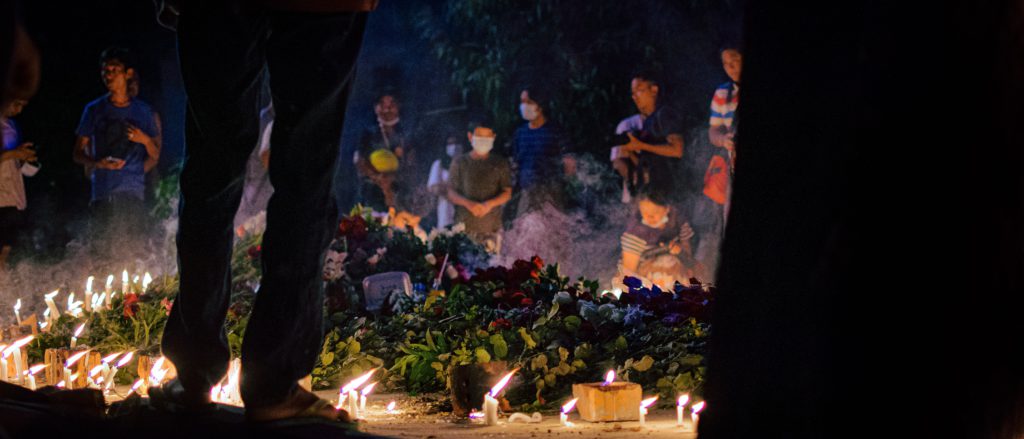Six months after the February 1 coup, Myanmar’s commercial capital, Yangon—once filled with protestors from all walks of life—is more eerily quiet than usual. The serenity of empty streets has been in great contrast to the loud cry for help across social media, where residents are trying to secure medical supplies and oxygen to save the lives of their loved ones affected by COVID-19.
On Sunday, the military-controlled Ministry of Health announced 2,674 new COVID-19 infections and 185 deaths, while the total cases have skyrocketed 153% from January’s 140,145 to 354,279. Myanmar saw a total of 13,263 reported deaths due to complications from COVID-19 as of August 15, but the number could be much higher.
Rising cases have pushed the healthcare system to the brink of collapse at a time of deep mistrust towards the regime. According to multiple media reports, public and private hospitals are running out of beds, while desperate residents in several cities have lined up outside oxygen refilling centers. Many patients have died in their homes as crematoriums overflow with bodies, independent news service Myanmar Now reported.
Meanwhile, the National Unity Government (NUG)—officially formed in mid-April by a group of ousted National League for Democracy politicians in exile or hiding, representatives from several ethnic minority groups, and activists—has risen to become a one-of-a-kind virtual government in the world, yet without de facto power. The NUG has embarked on a series of initiatives to provide telehealth and online education services to the Burmese population against the limitations imposed by the junta regime.
In response to the deadly COVID-19 third wave, the NUG has offered free teleconsultation services since June 19 and mobilized medical resources for the country. Between July 12 and 29, the NUG has donated 60,000 masks, 80 oxygen concentrators, 2,100 rapid COVID-19 test kits, 10,000 Paracetamol tablets, and 1,100 body bags for corpses, according to a post on its Facebook official account.
“The NUG has established a COVID-19 task force to deliver its own pandemic response and further counter the military’s claim to legitimacy. They are also trying to correct the junta’s woefully inadequate public health and vaccination program,” Hunter Marston, a Canberra-based Ph.D. candidate at the Australian National University whose research has covered Myanmar’s complex political landscape, told KrASIA.
With only 2.8% of the country’s 54 million inhabitants having received two jabs as of August 1, the NUG is working to procure vaccines and the equipment needed for a proper vaccination program, according to a statement published by the NUG. At the same time, the exiled government is working to convince the population to take the jab, as vaccination hesitancy among residents runs high.
“The junta lacks the resources, the capabilities, and the legitimacy to bring this crisis under control,” the UN special rapporteur on the situation of human rights in Myanmar, Tom Andrews, wrote in a statement published on July 14. The reality is even worse, with numerous reports accusing the junta of hoarding and seizing medical oxygen from factories and charities, as well as arresting voluntary doctors who treat patients at home.
The junta’s incapacity to overcome the healthcare crisis, together with its failure to gain effective control of the government, have turned the country into a “state failure,” Richard Horsey, International Crisis Group’s senior adviser on Myanmar, said in a briefing to the United Nations Security Council on April 9.
On the education front, although Myanmar’s schools reopened on June 1 for the first time since the military seized power, most classrooms remain empty, as some teachers and students—supported by their parents—defy the regime and refuse to attend school. As a result, only a quarter of Myanmar’s 12 million students signed up for the new school year, while over 125,000 of the country’s 430,000 school teachers have been suspended by the junta for participating in the civil disobedience movement, according to a Reuters report.

Edtech initiatives to fill the gap
Little after the reopening of schools, the NUG announced on Facebook on June 17 the launch of a mobile learning project for primary, secondary, and vocational schools via Moodle and Zoom as part of a hybrid learning program.
The NUG also plans to distribute recorded lectures through CDs and USB drives to students in areas with no internet access. The announcement, however, didn’t specify a starting date or details of the registration process. So far, the NUG’s Ministry of Education has partnered with different professors from international universities and industry veterans to give a flurry of public lectures and short vocational courses through livestreaming on Facebook, YouTube, and Zoom.
For example, David William, a law professor at the Indiana University Bloomington, has given lectures on federalism and ethnicity, whereas Mathias Jenny, an adjunct instructor of comparative language science at the University of Zurich, has held classes on language and society. On NUG’s YouTube channel, a course for civil engineering students that unpacks the foundation of building construction has amassed over 1,000 views since June.
The edtech space could help fill the gap in the formal education system, as students have been forced to seek alternative learning services. Other private initiatives, such as Spring University Myanmar, have also offered IELTS language courses to about 300 university students. The founders of the virtual university hope to support teachers and university-level students who participated in the nationwide strikes to sustain the momentum of the civil disobedience movement, co-founder Win told KrASIA in a previous interview.
Zoom diplomacy in the wake of the fight for legitimacy
Although the impact of the NUG initiatives has been somewhat limited so far, the virtual government is trying to gain legitimacy on the global stage with the help of social media, in particular Facebook. Dr. Sasa, the spokesperson of the NUG, is one of the key faces of the anti-military movement.
First known for his humanitarian work in the battle-ravaged Chin State, Dr. Sasa has held numerous Zoom meetings with ethnic armed groups and representatives such as the UN special rapporteur on the situation of human rights in Myanmar, Andrews, and with officers of the United Kingdom Mission to the United Nations. On Dr. Sasa’s Facebook page, screenshots of Zoom meetings featuring speakers showing a three-finger salute in support of the democratic movement typifies the NUG’s diplomatic efforts for international recognition.
“From February to April, we saw numerous ethnic armed groups commencing their unity talks with the NUG online, whereas, in the past ten years, it used to take many offline efforts to reach certain agreements. It has made everything happen in a much quicker manner,” said Marston.
Moe Thuzar, the coordinator for the Myanmar Studies Program at ISEAS-Yusof Ishak Institute, highlighted how Zoom had taken a predominant stage in the NUG’s diplomatic efforts, bringing many exposure opportunities despite the convoluted situation in Myanmar. “Yet, there are some drawbacks related to bandwidth and time difference. Additionally, diplomacy usually places importance on conveying delicate nuances via body language and tone, which are better captured or conveyed in in-person meetings and conversations,” she told KrASIA.
Read more: Supporters and detractors of Myanmar’s coup take fraught conflict to TikTok, Facebook, and Twitter

What’s next?
Despite NUG’s efforts, challenges remain. “The current situation of being a government in hiding, or exile, without actual control of the organs of state power hampers the NUG’s agility in responding to the needs of the people of Myanmar,” Moe Thuzar said.
Six months after the Myanmar coup, both the NUG and the military junta are racing for diplomatic recognition at the United Nations. In September, a nine-country Credentials Committee is expected to make a recommendation to the 75th UN General Assembly about whose credentials to accept. Although it is rare for the Committee to support the credential of a government that does not hold power or control over its territory, this has happened before in Haiti in 1992 and Sierra Leone in 1997, according to The Lowy Institute, an Australian think tank.
“The fact that a parallel government exists is a powerful reason for external partners or countries to pause before endorsing the military, as the NUG is acting as a government in many ways. For example, they’ve helped with the civil disobedience movement and funded COVID-19 relief efforts. These are the things that a government does,” Marston highlighted.
“Working with a wide network of supporters and with civil society organizations will help the NUG reach wider swathes of communities and people across Myanmar, although the junta’s restrictive and repressive actions present a challenge to these efforts,” Moe Thuzar added.
